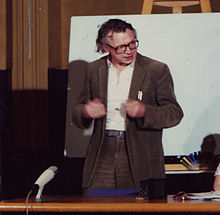Rudolph Bahro
| Rudolf Bahro | |
|---|---|

Bahro in 1991
|
|
| Born |
November 18, 1935 Bad Flinsberg, , Prussia |
| Died | December 5, 1997 (aged 62) Berlin, Germany |
| Nationality | German |
| Occupation | Philosopher, politician |
Rudolf Bahro (November 18, 1935 – December 5, 1997) was a dissident from East Germany who, since his death, has been recognised as a philosopher, political figure and author. Bahro was a leader of the West German party The Greens, but became disenchanted with its political organization, left the party and explored spiritual approaches to sustainability.
Bahro was the eldest of three children of Max Bahro, a livestock-industry consultant, and Irmgard Bahro (née Conrad). Until 1945, the family lived in Lower Silesia: first in the spa town of Bad Flinsberg and then in neighboring Gerlachsheim, where Bahro attended the village school. Towards the end of World War II Max Bahro was drafted into the Volkssturm, and, after his capture, detained as a Polish prisoner. As the Eastern Front approached, the family was evacuated and Bahro was separated from his mother and siblings during the flight (the rest of Bahro's family, with the exception of his father, died of typhoid soon afterwards). Bahro lived with an aunt in Austria and Hesse, spending several months in each location and eventually reuniting with his father, who was managing a widow's farm in Rießen (now part of Siehdichum).
From 1950 to 1954, Bahro attended high school in Fürstenberg (now part of Eisenhüttenstadt). Since it was assumed that all high-school students would join the Free German Youth (FDJ), Bahro reluctantly joined in 1950. This was, as he later commented, the only time he did something against his will under pressure. In 1952 he applied for membership in the Socialist Unity Party (SED), which he joined in 1954. Bahro was regarded as intelligent, and graduated from high school with honors. He attended Humboldt University in Berlin from 1954 to 1959 and studied philosophy. Among his teachers were Kurt Hager (who later became the philosopher of the SED), Georg Klaus and . The topic of his thesis was "Johannes R. Becher and the relationship of the German working class and its party to the national question of our people".
...
Wikipedia
